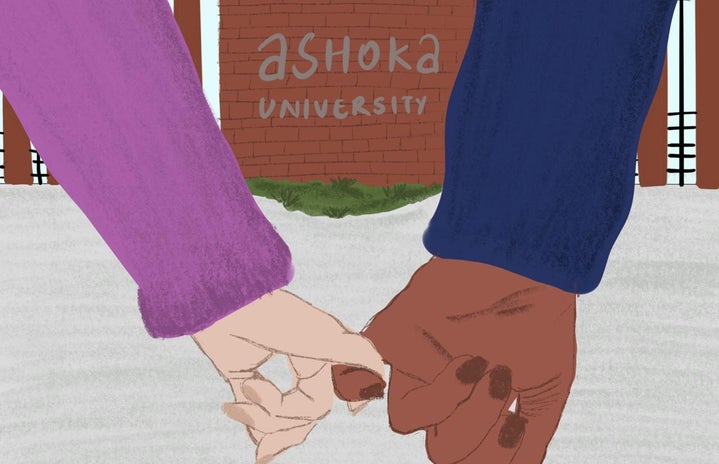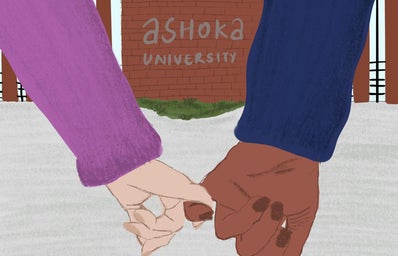Edited by Maya M. Haidar
You know when you are walking back to the dorm after a full day of classes and get a text from a friend asking, ‘are you free?’. This text is different because you know something is wrong immediately. You rush to the lift, press their floor button and formulate all the countless things that could have gone wrong. Is it math? Is it that same person who doesn’t deserve them? Or is it just Ashoka in general? Yes, this is very much a thing. Walking through the hallway, you gear yourself for whatever comes next and knock on their door. Mind you, this is probably the only time you do this, because you don’t know what’s coming next. Sometimes, even the tone of their ‘come-in’ can be a big hint as to how they are doing. You enter their room and find them bright red-eyed (and not in a fun, sexy way), and you are instantly all ears.
I know that many of you will be familiar with such a situation. The interesting thing about college friends is that you haven’t known them your whole life. They have 17 years worth of memories that do not involve you, and hence you don’t know much about their past—and you probably never will. But the cracks in their voice, the constant gulps to suppress the salt droplets from trickling down their cheeks with their throat filling up as they try to let you into their life, can almost break your heart.
All through this, you also feel a certain sense of pride towards two things. One, that your friend has the courage to share something vulnerable about themselves. Two, your friend feels comfortable enough to share their vulnerability with you. Therefore, you try your level best to establish a place of comfort and security for them.
Once they are done venting, to make them feel grounded, you switch to Mom mode, either making them do deep breaths and give them hugs and food, or crack bad jokes. You do whatever you think is right in the moment to bring a smile to their face.
Now comes the part where you want to ‘be there’ for this friend. There can be numerous ways of doing this but what happens is that there is an unsaid pressure that emerges on both parties.
As for you, the pressure of saying the ‘right thing’ becomes important. You don’t want your friend to feel that they have opened up to you only to hear some advice that isn’t worthwhile. You want them to instantly feel better, but this leads to a performance pressure to say the ‘right thing’ that was uncalled for. I know I have felt this countless times. But whenever you try and figure out what the ‘right thing’ is, you are usually clueless, and since Googling isn’t an option, you do the next best thing: you take their ‘problem’ and attempt to solve it using your past experiences. One of the defining mottos of friendship has been joh tera hai woh mera hai meaning what is theirs, is also yours, be it a problem, food, or 4G internet.
As a result, you only listen to the friend with an intent to reply with solutions. While they unfold the very issue that is bothering them, we begin to make mental pointers of what we can say to make them feel better immediately. There will be that one thing that pops out of nowhere in your mind, that you know, or at least think you know, will really benefit them. This is when the listening often stops because you naively believe you have found the solution. So even when you are looking in their teary eyes, nodding your head and acknowledging their feelings, the urge to share the solution becomes stronger. It’s like when in a classroom the teacher is still explaining the math problem but there is that one kid who raises their hand because they already know the answer. Do you remember how you felt about such kids?
Therefore, instead of the conversation becoming about their vulnerabilities, it now shifts to you and your solution.
But why is there a need for us to be the ‘saviour’ for an individual who confides in us? Why is the notion of supporting a friend attached to providing them with solutions that makes them instantly better? More importantly, why do we believe that our worth as a friend is judged on how well we resolve their issue for them?
As for the other side, this friend who shares their vulnerability may feel the pressure to validate the advice or ‘solutions’ you provide for the ‘problem’. This is usually out of guilt about the fact that the other person has taken out the time to listen to what they have to say and is attempting to solve it. The friend takes on the task of reassuring your worth by thanking you for your solutions and letting you know how much you helped them, even if they didn’t.
But how is this pressure dynamic of wanting to say the right thing and needing to validate the same, helping any of the respective parties involved? At the end of the day, we all know that the problem is going to persist, since it cannot possibly be solved by two teenagers in one conversation. This doesn’t mean that the advice you give isn’t helpful, it is just temporary because the ‘problem’ will come back, maybe through different triggers because it was never fully resolved.
So how do we go about ‘being there’ for a person who needs our support and navigate through such a situation?
It is pretty easy.
You ask them. Each individual has a different coping mechanism and as long as it is healthy, it should be respected. If it means they need to go off the grid, help them do the same. If they want someone to just listen, be present for them in that moment, without feeling entitled to have an opinion on things. Only if they request you to provide them with possible solutions, indulge in attempting to form them.
We need to realise that at the end of the day we are just a bunch of 18-19 year olds trying to make a place in this world, each dealing with struggles that are not easy. Instead of wanting to solve the problem, just knowing that there is someone out there ready to listen, or is going through the same, is enough. Each individual experience is different and can’t be resolved through the same solutions because jo tera hai cannot possibly be mera, be it a problem, food or 4G internet.


